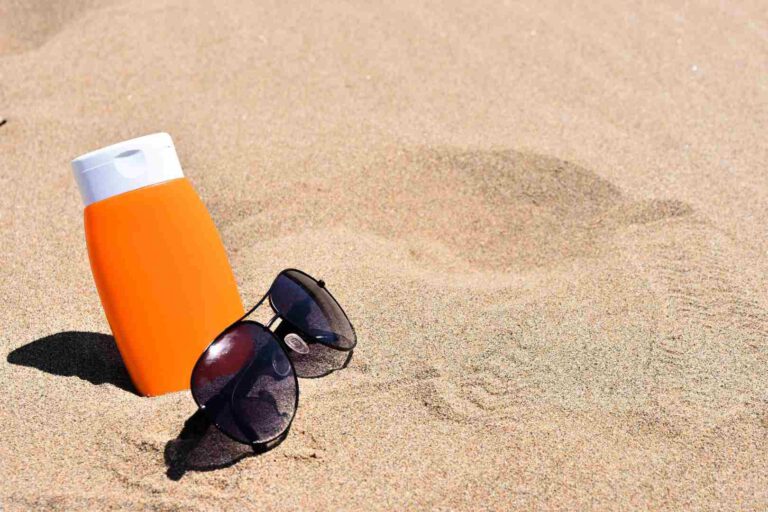How can you sunbathe ecologically?
Contents:
- How does ultraviolet radiation work?
- Positive effects of UV radiation
- The effect of sunscreens and their impact on the environment
- Eco-tanning
After a long winter, when the days get longer and warmer, most of us enjoy exposing our bodies to the sun. We go for walks in the sun, host get-togethers and barbecues, ride our bikes, and our children play longer in the garden. Finally, it's time for our skin to acquire a beautiful, healthy, golden hue. We also realize that we need to protect ourselves with a high SPF cream so that sunbathing doesn't harm us and we avoid sunburn. This is especially important for children and people with fair skin.
How does ultraviolet radiation work?
We can distinguish different types of UV radiation:
- UVA: It can penetrate the deeper layers of the skin. It is responsible for premature skin aging. It can contribute to the damage of skin cells called keratinocytes, thus promoting the development of skin cancer.
- UVB: This is the radiation that usually causes redness, blisters, and burning.
- UVC: This is short-wave radiation and has a carcinogenic effect on living organisms. It is absorbed by the ozone layer and therefore does not reach the Earth's surface.
Positive effects of UV radiation
Sun exposure of the skin is very important because:
- helps in the production of vitamin D in the body,
- supports the absorption and deposition of the elements calcium and phosphorus necessary for bone formation in the body.
The positive effects of the sun on our bodies don't change the fact that prolonged exposure to ultraviolet radiation on the skin can lead to premature aging, eye irritation, and, in the worst case, the development of skin cancer. That's why sunscreens with UV filters help us.
The effect of sunscreens and their impact on the environment
Creams with UV filters come in two forms – chemical UV filters and mineral UV filters.
- non-chemical filters:
- After application, they act like a mirror on the skin surface and reflect harmful ultraviolet radiation.
- In their production, titanium dioxide is used to protect against UVB radiation and zinc oxide to protect against all UV radiation.
- Mineral filters without nanoparticles are particularly recommended for people with sensitive skin, allergy sufferers and children,
- They are not absorbed by the skin, but act as a protective barrier on the skin's surface.
- chemical filters:
- protect the skin through a chemical reaction,
- contain ingredients such as: oxybenzone, avonbenzone or octocrylene.
- are absorbed into the body through the skin, their presence can be found in the bloodstream, urine or even breast milk,
- interfere with the natural functions of hormones. This is influenced by ingredients such as 4-methylbenzylidine camphor, benzophenone 3, 3-benzilidine camphor, 2-methylhexyl 4-methoxycinnamate, ethylhexyldiol, and methylparabenzoic acid.
Unfortunately, it turns out that chemical filters have many disadvantages:
- the effect of the chemical substances contained therein on humans has not been sufficiently investigated,
- they can disrupt the hormonal balance,
- The substance Padimat O contained therein can contribute to the release of free radicals,
- the preservative methylisolthiazolinone contained therein is a strong allergen and is suspected of being neurotoxic,
- They penetrate the water and can accumulate in the fatty tissue of aquatic animals. Many substances known to disrupt the function of the endocrine system have been detected in fish tissue.
- Contribute significantly to water pollution and coral reef destruction because they contain oxybenzone and ethylhexyl methoxycinnamate. Coral reefs provide shelter for 25% of all marine life, produce oxygen, and balance carbon dioxide in the water. To protect corals, the sale of sunscreens containing chemical filters is prohibited in Hawaii.
Eco-tanning
To ensure that tanning is safe for us, protects our skin well from ultraviolet radiation and at the same time protects the natural environment, we should follow a few simple rules when tanning.
- In summer, avoid direct sunlight between 11:00 a.m. and 3:00 p.m.
- let us cover our bodies with clothes and not forget to cover our heads,
- Remember to protect your eyes and wear sunglasses with UV filters
- Let's use sunscreens and creams with non-chemical sunscreens that are safe for us and the environment.
THE PUBLISHER'S CHOICE
Dried plums 1 kg BIOGO
- £6.08
- £6.08
- Unit price
- / per
Dried White Mulberries 500 g ORGANIC
- £5.06
- £5.06
- Unit price
- / per
Almonds 1 kg BIOGO
- £10.14
- £10.14
- Unit price
- / per
Cranberries sweetened with apple juice organic 1 kg BIOGO
- £14.20
- £14.20
- Unit price
- / per
Dried dates 1 kg BIOGO
- £3.65
- £3.65
- Unit price
- / per
Unpeeled buckwheat groats 1 kg BIOGO
- £2.44
- £2.44
- Unit price
- / per
Walnuts 800 g BIOGO
- £7.50
- £7.50
- Unit price
- / per
Peeled sunflower seeds 1 kg BIOGO
- £2.64
- £2.64
- Unit price
- / per
PULLED ORGANIC SUNFLOWER SEEDS 1 KG BIOGO
- £3.85
- £3.85
- Unit price
- / per












































































































































